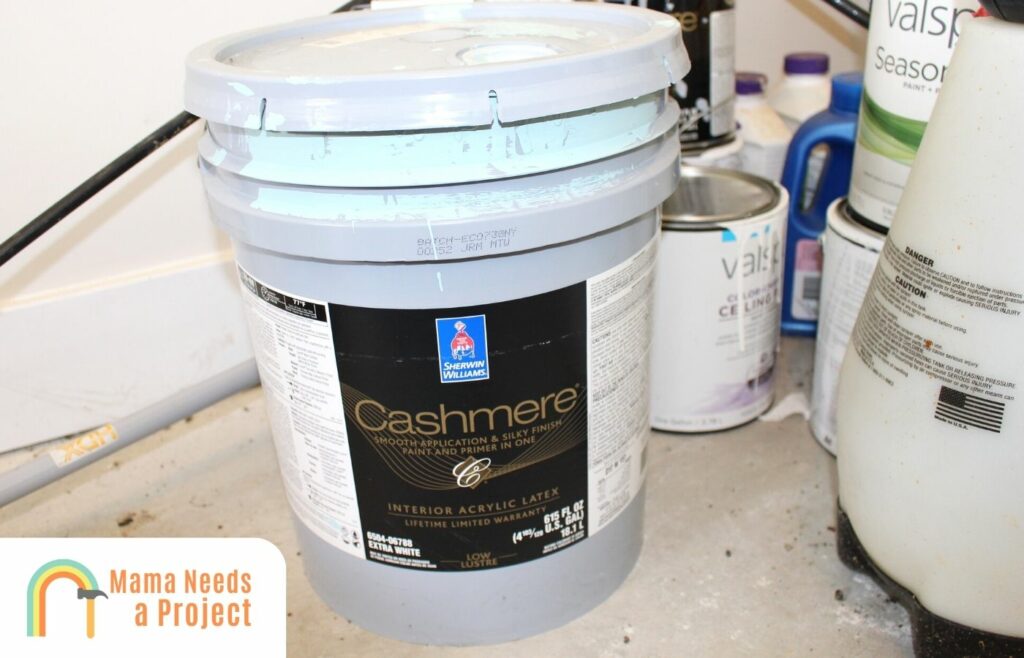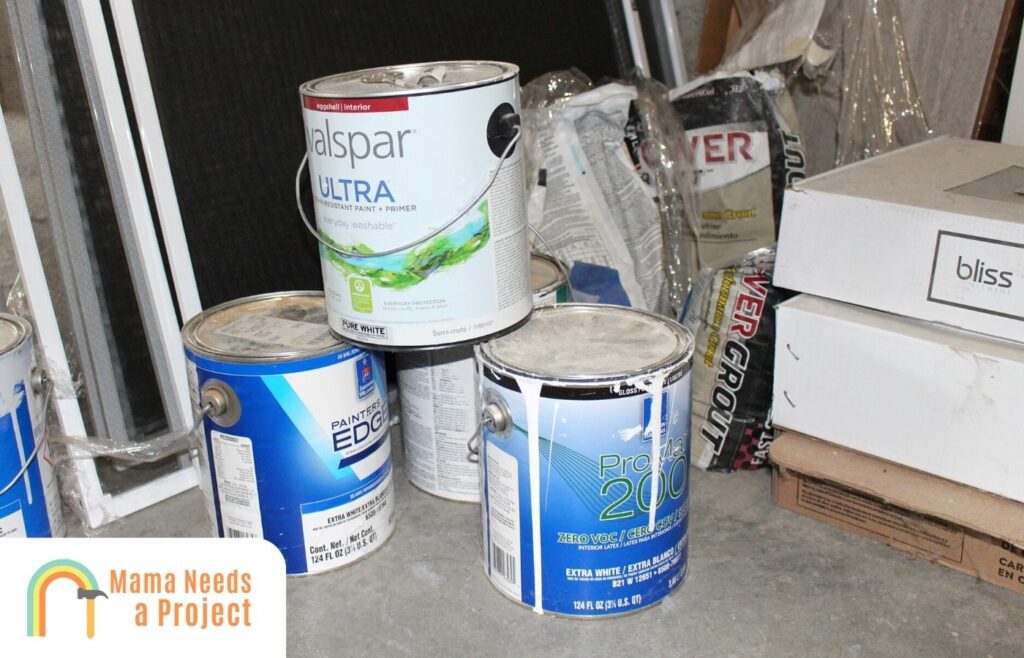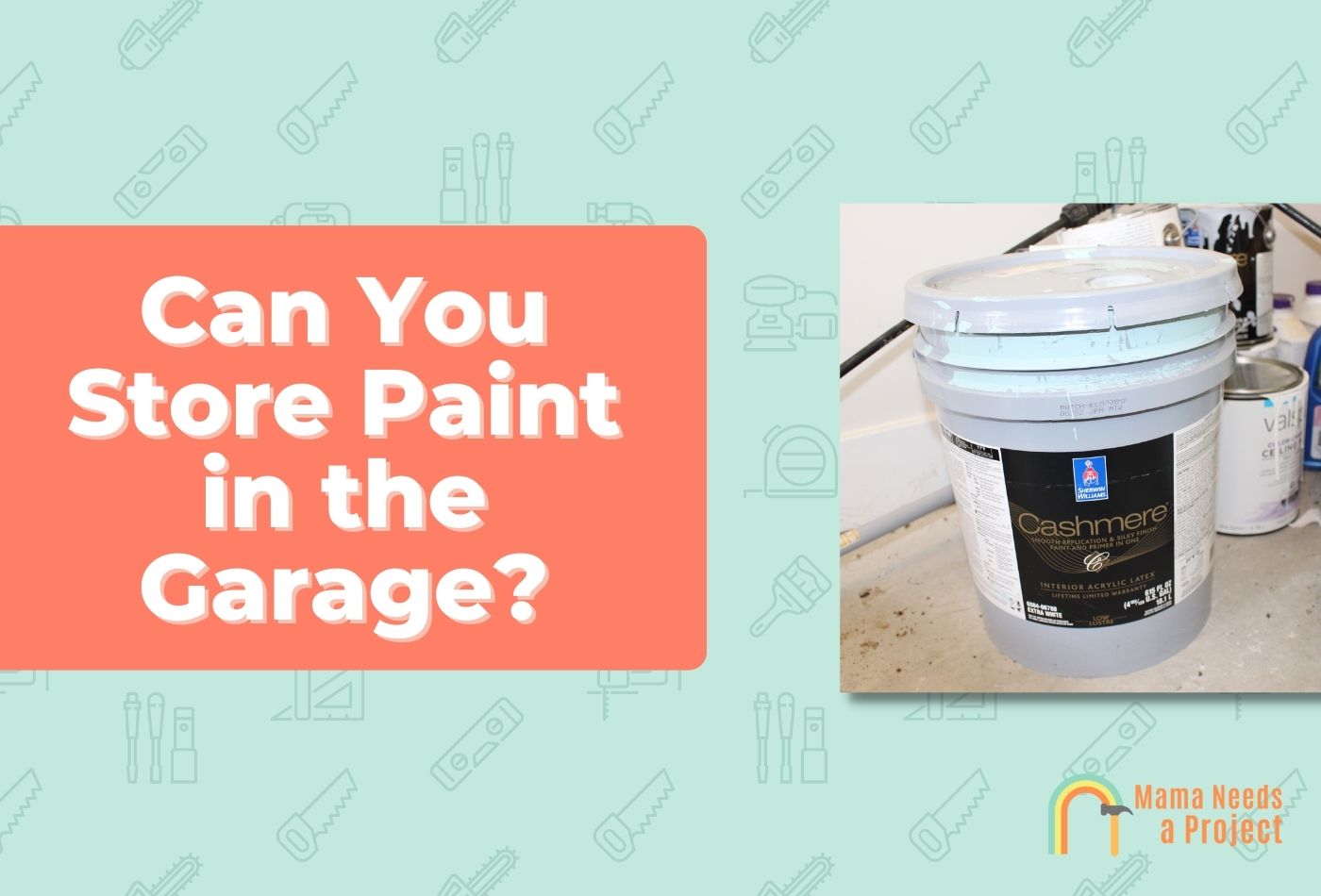Can You Store Paint in the Garage? (Tips & Tricks!)
Do you have leftover paint from that home painting project you just finished? While it would certainly be ideal to purchase the exact amount you needed, we all know this never happens.
It would be a shame to waste all that quality paint, so let’s save it for later!
Now you might be wondering, can you store paint in the garage? Where should it go?
It’s important to know where in your home you can store paint and how to store it properly to conserve it so you can use it later. Wondering the correct way to store paint? Let’s find out!
- Avoid storing paint in the garage, especially if you live in a location with significant climate changes.
- Instead, opt to store your remaining paint in a cool, dark room like a basement, flammable cabinet, or back of a storage closet.
- Keep the paint out of direct sunlight, clean and reseal the can properly, and place excess paint in an airtight container.
Can You Store Paint in the Garage?

So, can you store paint in the garage or not? Long story short, you should avoid storing paint in a garage if at all possible. Unfortunately, garages typically don’t offer the optimal conditions for paint storage.
To prevent the chemical formula in most commercial paints from being altered, the paint should be stored in a room that stays between 60 and 80 F degrees. If paint is stored in extreme heat or cold for too long, it will be compromised or ruined.
Why You Should Avoid Storing Paint in the Garage
As most homeowners know, garages aren’t designed to be climate controlled rooms. It would be energy-inefficient to run an AC or heater in a garage that only stores cars, supplies, and lumber storage.
Storing paint or stain in the garage will expose it to high humidity or freezing temperatures, depending on where you live and the season. Because of this, the garage is unfortunately a poor place to house paint.
So, what actually happens to the paint when it’s stored for too long in a hot or cold garage?
The paint will change in consistency and its components might separate. When this happens, the paint will become very difficult to apply smoothly and leave you with a poor paint job.
In extreme temperature changes, the chemical responses might even make the paint unstable or hazardous to inhale or come into contact with.
Where to Store Leftover Paint

If your garage isn’t climate controlled (which most aren’t!) and you don’t live in a location with year-round mild weather, there are other options.
If you’re trying to decide where to store leftover paint, the key here is to find a climate-controlled room within your home. The ideal spot will be cool, dry with low humidity, and out of direct sunlight.
Here are a couple of places you can confidently store leftover paint to make it last:
- A basement
- The back of a cool closet
- Flammable (safety) cabinet
- A small storage or pantry closet
Again, spaces that stay between 60 and 80F are ideal.
Note: you don’t want to store paint in a room with food and drinks, even if the paint is technically non-toxic.
And if you have little ones in your house, make sure your paint is stored up high, locked away, or hidden so they don’t have access to it.
Wondering how much paint weighs? Check out my guide to learn how much a gallon of paint weighs for more info!
How to Store Paint Properly to Use For Later
Ready to properly store your paint so that it maintains a long shelf life?
By following these simple but important paint storage steps, your spare paint will last for months or years to come. And your future self, paintbrush in hand, will thank you for the saved money and time.
1. Find a Temperature-Controlled Place to Store the Paint
First, select a cool place to store the paint in your home. Basements are great go-tos for this, as they typically stay relatively cool and dark on their own.
But not everyone has a basement. Do you belong to that category? The back of a spare closet, cabinet, or a pantry supply closet should do just fine!
Use a Flammable Cabinet
Some paint manufacturers also recommend storing your commercial paints in a flammable cabinet. But why?
Well I forget this as often as anyone, but paint is in fact a flammable material. So it can actually pose a fire hazard in your home.
If you’re attempting to be as safe as humanly possible, consider storing your paint in a flammable safety cabinet.
2. Thoroughly Clean and Reseal Paint cans after Use
I know, I know. The last thing you feel like doing after slaving away for hours painting your walls is to do a thorough clean-up job.
But I promise, if you just take a few extra minutes to do this step, your paint will last so much longer (and you’ll be grateful later).
After you finish using your paints, take a paper towel or rag and thoroughly clean paint off the rim of the cans. This will allow for the best possible seal so you can properly store paint without air or moisture getting in your cans.
To close up the can lid for an air-tight seal, try using a layer of plastic wrap. This will serve as a makeshift gasket between the can rim and the lid.
Place the lid back on tightly, and firmly pound it down with a rubber mallet. Avoid using a hammer, as this can dent the lid and prevent proper sealing.
3. Use the Appropriate Paint Storage Container
If you only have a small amount of paint left in a big can, consider moving the paint into a smaller storage container.
It’s best to limit the amount of excess air inside any given paint storage container. Air will speed up the expiration process. That’s why you should add plastic wrap to enhance the tightness of the seal!
Sealable plastic containers are okay, but small metal cans are even better for preserving the paint formula.
Paint companies sell these, such as this 1-qt and gallon metal paint bucket and lid. Remember, using plastic wrap as a gasket between the rim and lid works wonders as a tight seal.
- CONVENIENT COMBO PACK: You get 1 Gallon Can with Lid & Handle and 1 Quart Can with Lid
- UNLINED: Both cans are unlined (no chemical substances to react with your contents)
- TRADITIONAL USE: Used for solvents & oil-based products; may also be used for coatings, adhesives, mastics and…
4. Keep out of Direct Sunlight
It may not be enough to store your paint in a cool, dry place and seal it tightly. If possible, store it in a dark area out of direct sunlight.
When paint is exposed to direct sunlight and heat for too long, its components can separate. This might render it unusable, or at the very least, difficult to apply smoothly.
This tip is especially crucial if we’re discussing spray paint. Spray paint is full of combustible, volatile chemicals that can be dangerous if heated to a certain temperature.
If spray paint cans sit in direct sunlight for a long time and get too hot, they can explode. So be cautious and store your spray paint in a dark place.
The back of a closet or an unfinished basement is an ideal place to prevent sunlight from reaching your precious, expensive paints.
FAQs
Can you store spray paint in the garage?
If possible, avoid storing spray paint in the garage. Spray paint cans contain aerosol and other volatile chemicals, which can be explosive in extreme heat. It’s safest to store your spray paint in an environment between 60 and 80 degrees F. Make sure it’s locked away, or hidden and out of reach of children.
How Long Can Paint Be Stored Before it Goes Bad?
An opened can of paint that’s properly resealed and stored can last a long time! Its shelf life is around 5-10 years. If you crack open your stored paint after a couple years and it doesn’t smell like rotten eggs or look chunky, it’s probably good to use. Plus, unopened cans of paint may last for even longer, upwards of 15 years.
How Do You Know if Paint Has Gone Bad?
If paint has gone bad, you might smell a sour, rancid scent when you remove the lid. Some expired paints may present as chunky or lumpy, with a skin-like film on the surface of the paint.
Still not sure if it’s bad or not? Take a paint stirrer and mix it up. Is it chunky throughout? The paint has surely gone bad.
Final Thoughts
To recap, you shouldn’t store paint in your garage, unless the room stays between 60 and 80F year round or is climate controlled.
To conserve your paint properly and ensure it lasts, store your paint in a cool, dark place like a basement or closet.
Never store paints with food and drink, or within reach of kids. And make sure you clean paint off the rim and reseal with a rubber mallet after use.
If you follow all these steps, your paint will last for years and be there when you need it for your next fun creation!

Jessica Vaillancourt is a freelance writer and blogger obsessed with the Travel, Wellness, and Personal Development industries.
She has 5+ years of experience helping human-first agencies, global companies, and entrepreneurs crush their content marketing goals, and serve more people. Jessica’s work has appeared on leading websites like UpgradedHome.com, BetterHelp.com, and TheDiaryofaNomad.com.
Today, her sole focus (besides finding the world’s best coffee shop) is writing to serve humans, and slow traveling abroad to expand her mind. You can get to know her work at JessAnneWriting.com.


